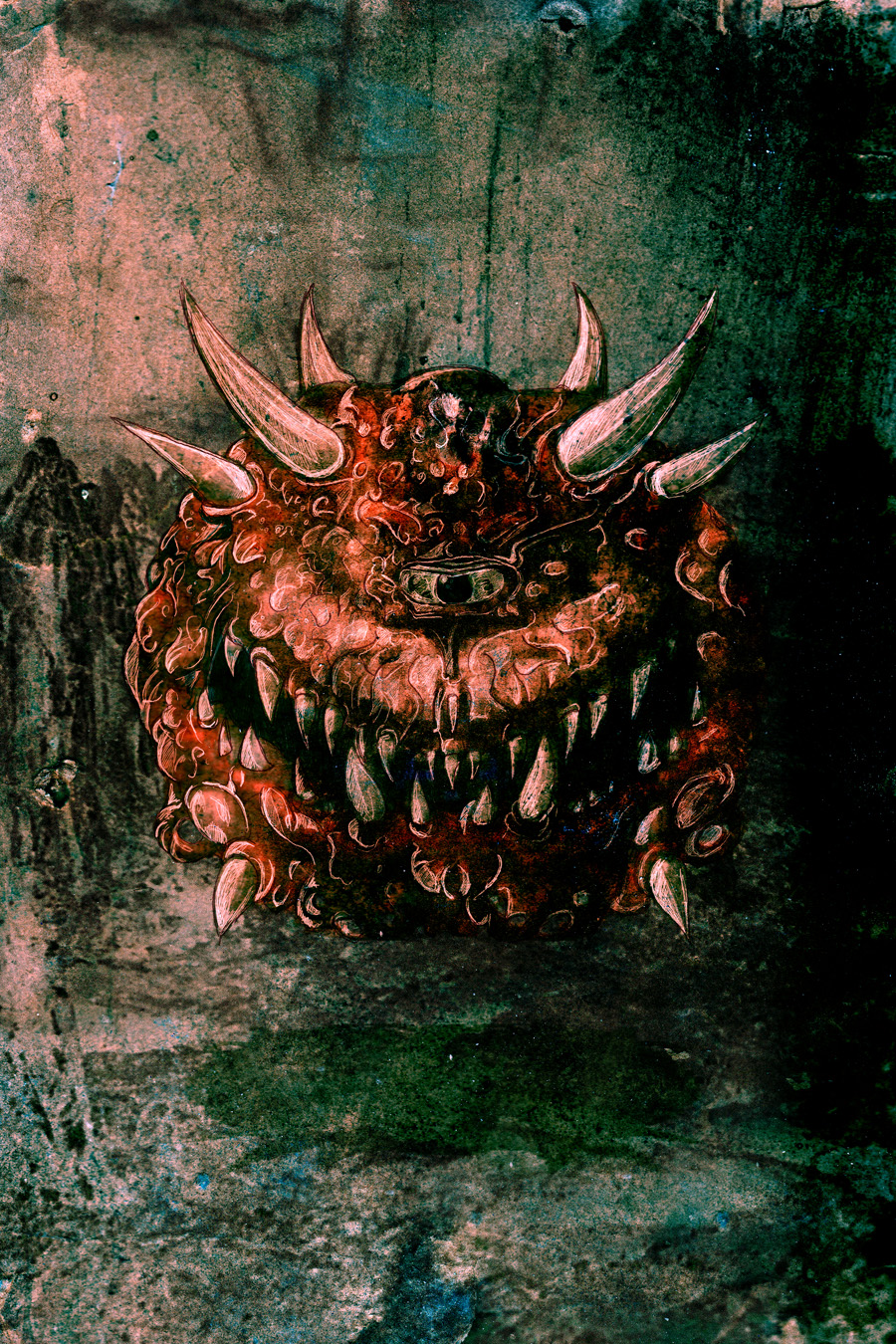Cacodemon
(Conjuration/Summoning)

Cacodemon
(Conjuration/Summoning)

|
|
|
|
|
|
|
|
|
|
|
|
|
|
|
|
|
|
|
|
|
|
|
|
Effect: This perilous
exercise in dweomercraeft summons up a powerful demon
of type IV,
V,
or VI,
depending upon the demon's
name being known to the magic-user.
Note that this spell is not
of sufficient power to bring a demon of greater power,
and lesser sorts are not
called as they have no known names.
In any event, the spell
caster must know the name of the type IV, V, or VI demon he or she is summoning.
As the spell name implies,
the demon so summoned is most angry and evilly disposed.
The spell caster must be
within a circle of protection
(or a thaumaturgic triangle
with protection from evil)
and the demon confined within
a pentagram (circled pentacle)
if he or she is to avoid
being slain or carried off by the summoned cacodemon.
The summoned demon can be
treated with as follows:
1) The magic-user can require
the monster to perform a desired
course of action by force
of threat and pain of a spiritwrack spell
(q.v.),
allowing freedom whenever
the demon performs the full extent of the service,
and forcing the demon to
pledge word upon it.
This is exceedingly dangerous,
as a minor error in such
a bargain
will be seized upon by the
monster to reverse the desired outcome or simply to kill and devour the
summoner.
Furthermore, the demon will
bear great enmity for the magic-user forever after such forced obedience,
so the spell caster had
better be most powerful and capable.
2) By tribute of fresh human
blood and the promise of 1 or more human sacrifices,
the summoner can bargain
with the demon for willing service.
Again, the spell caster
is well advised to have ample protection and power to defend himself or
herself,
as the demon might decide
the offer is insufficient
-- or it is easier to enjoy
the summoner's slow death --
and decide not to accept
the bargain as offered.
Although the demon will
have to abide by a pledge, as his name is known,
he will have to hold only
to the exact word of the arrangement, not to the spirit of the agreement.
On the other hand, only
highly evil magic-users are likely to attempt to strike such a bargain,
and the summoned cacodemon
might be favorably disposed towards such a character,
especially if he or she
is also chaotic.
3) The summoned demon can
be the object of a trap the soul spell (q.v.).
In this case, the magic-user
will not speak with or bargain for the demon's services,
although the cacodemon might
be eager to reach an accord with the dweomercraefter before he is forced
into imprisonment.
The trapping of the demon
is risky only if proper precautions have not been taken,
for failure to confine the
monster usually means only that it is able to escape to its own plane.
Once trapped, the demon
must remain imprisoned until the possessor of his object of confinement
breaks it and frees him,
and this requires one service
from the now loosed monster.
If the individual(s) freeing
the demon fails to demand a service when the manster asks what is required
of him,
the demon is under no constraint
not to slay the liberator(s) on the spot,
but if a service is required,
the creature must first do his best to perform it and then return to the
Abyss.
The duration of service of
any demon must be limited unless the demon is willing to serve for on extended
period.
Any required course of action
or service which effectively requires an inordinate period of time to perform,
or is impossible to perform,
is 50% likely to free the
demon from his obligations and
enable him to be unconstrained
in his vengeance upon the spell caster if he or she is not thereafter continually
protected,
for a demon so freed can
remain on the plane it was summoned to for as long as 666 days.
The demon summoned will be exceptionally strong, i.e. 8 hit points per hit die.
Casting Time: Casting time is 1 hour per type (numeric) of the demon to be summoned. If there is any interruption during this period, the spell fails. If there is an interruption while the cacodernon is summoned, it is 10% probable that it will be able to escape its boundaries and attack the magic-user, this percentage rising cumulatively each round of continued interruption.
Saving
Throw: Each demon is entitled to a saving throw versus this summoning
spell.
If a score higher than the
level of the magic-user summoning is rolled with 3d6 (2d10 with respect
to type VI demons),
that particular spell failed
to bring the desired demon.
When this occurs, it is
certain that the named demon is imprisoned or destroyed or the name used
was not perfectly correct,
so the spell caster will
have to call upon another name to bring forth a cacodemon.
MC:
The components of this spell are 5 flaming black candles;
a brazier of hot coals upon
which must be burned
sulphur,
bat hairs,
lard,
soot,
mercuric-nitric acid crystals,
mandrake root,
alcohol,
and a piece of parchment
with the demon's name inscribed in runes inside a pentacle;
and a dish of blood from
some mammal (preferably a human, of course) placed inside the area where
the cacodemon is to be held.
*
can be cast and will function within the bounds of an airy water spell.